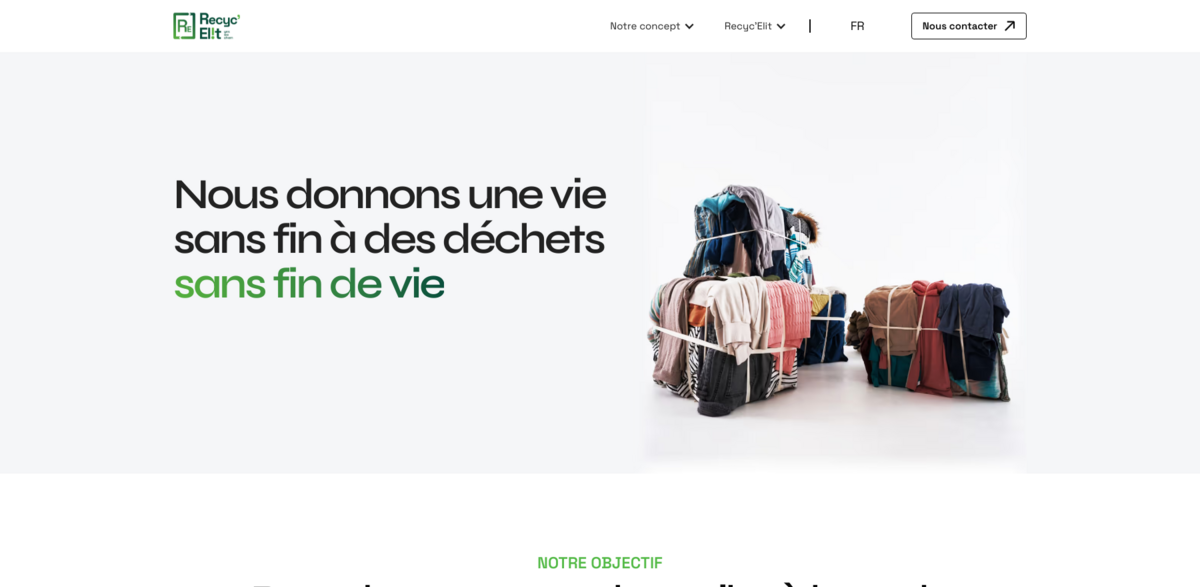What is the Project?
Recyc’Elit is a French innovator that has developed a patented, low-impact process for recycling complex polyester-based textiles that would otherwise be destined for landfilling or incineration. The technology transforms end-of-life textiles into new, high-quality raw materials for the textile industry. This project addresses a significant environmental and societal challenge by offering an industrial solution that is both sustainable and remarkably efficient. By recovering not only the polyester but also the accompanying co-materials such as elastane, cotton, polyamide, and polyurethane, the process ensures that almost all materials present in a textile are valorized. It is, in essence, a true circular process that pushes the boundaries of what is possible in textile recycling… a real game changer in the industry.
Main Benefits of the Process
- 71 million tons of polyester placed on the market in 2023.
- 10 million tons of post-consumer textile waste generated by Europe annually.
- 12.5% of textiles use recycled polyester, yet only 2% of recycled polyester is derived from textiles.
- Polyester represents 57% of fibers produced globally in 2023, with this share continuing to grow.
- No need for pre-sorting even with coloured, opaque, and multi-fibre textiles, thanks to the innovative technology.
Innovative Recycling Solutions
The process stands out due to its exceptional energy efficiency and operates at very low temperatures and at atmospheric pressure, greatly reducing its environmental footprint. This innovative method is selective for polyester, meaning that it precisely separates PET from other materials like elastane, polyamide, and cotton without degrading them. It opens up a path for true circularity by not only recycling the polyester component but also recovering valuable co-materials that can be reintegrated into the supply chain. The revolutionary separation technique ensures that every part of the textile is given an opportunity to be reused, which is a significant leap for sustainability in textile recycling… it’s as if recycling reached an entirely new level.
Breakthrough in Textile Recycling
The focus on chemical recycling of polyester-based textiles explains the breakthrough achieved by the technology. Unlike conventional methods, this process can handle complex PET-based blends in all their forms – including technical textiles, post-production waste, and post-consumer items – without the hassle of extensive pre-processing. Special attention is given to maintaining the high-quality recovery of both the primary polyester and its co-materials. This ensures that the end product, recycled polyester pellets (rPET), is as valuable as virgin polyester, offering a sustainable alternative that is ideal for the textile sector.
Technological Advancements & Process Details
Recyc’Elit’s process utilizes a selective chemical recycling method that is both gentle and effective. By operating under mild conditions, it can separate almost all associated materials while preserving their inherent quality. This advanced process not only recovers the polyester from materials such as elastane, polyamide, and cotton, but it also opens doors to valorizing these co-materials in a circular economy. The process is perfectly tailored for recycling all textiles where polyester is predominant. In doing so, it solves the dilemma of waste and inefficient resource use. Additionally, initiatives like CASTTOR, which focuses on a pre-industrial demonstrator for chemical recycling, SOLSTICE for processing post-consumer textiles, and SORT4CIRC for enhanced identification and recycling, illustrate the breadth and scalability of this transformative technology.
Project Impact on Sustainability
- SDG 9: Industry, Innovation, and Infrastructure – Promoting resilient infrastructure and fostering innovation in recycling technologies.
- SDG 12: Responsible Consumption and Production – Advancing sustainable production patterns by reintegrating recycled materials.
- SDG 13: Climate Action – Reducing greenhouse gas emissions through energy-efficient, low-temperature operations.
- SDG 15: Life on Land – Limiting environmental impacts associated with textile waste by preventing landfilling and incineration.
- SDG 11: Sustainable Cities and Communities – Contributing to the development of greener, more sustainable urban environments by improving waste management.
Future Prospects and Industry Transformation
The technology is not just a step forward in textile recycling – it represents a bold reimagining of resource utilization in the textile industry. With its ability to process diverse textile types and recover multiple materials, the patented process sets a new standard for what can be achieved in terms of circularity. The ongoing projects highlight the potential to scale this technology and embed sustainable practices firmly within the textile sector. As the industry increasingly prioritizes low-carbon and efficient solutions, initiatives like this are poised to redefine recycling, reduce waste, and inaugurate a future where textiles are not simply discarded after use but are reborn as valuable resources. This forward-thinking approach underlines a commitment to environmental stewardship and paves the way for a dramatically transformed, circular textile ecosystem…






















